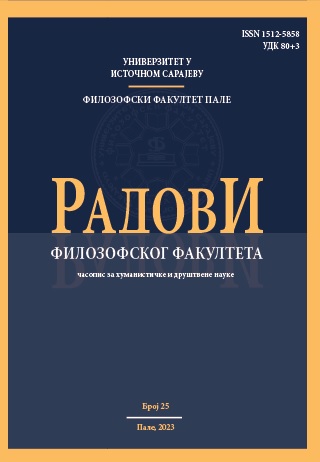ПИТАЊЕ ИДЕНТИТЕТА У ДРАМИ ПОД РУШЕВИНАМА ДУШАНА ВАСИЉЕВА
THE QUESTION OF IDENTITY IN DUŠAN VASILJEV’S DRAMA UNDER THE RUINS
Author(s): Milica T. ĆesarevićSubject(s): Serbian Literature, Theory of Literature, Politics and Identity, Identity of Collectives, Sociology of Literature
Published by: Универзитет у Источном Сарајеву, Филозофски факултет Пале
Keywords: identity; war trauma; expressionism; drama; Dušan Vasiljev;
Summary/Abstract: Pointing out the key aspects of anthropological, ontological, psychological and social problems, the paper discusses the experience of war trauma and its destructive consequences on personal identity in the context of Dušan Vasiljev’s dramatic work, specificly the play Under the Ruins [Pod ruševinama]. In this context, we strove to delve into various aspects of numerous types of post-traumatic responses to disturbing experiences, including the concepts of moral and ethical prophetism and hypersensitivity. Additionally, the melancholic question of the inconsistent will, and furthermore, downfall of all values and psychological aspects of unhealthy eroticism is explored. The observation of these themes leads to an explanation of the complex question of unstable identity and its resulting (self)destruction in the context of different characters, their psychology, characterization and interrelations. Owing to this interpretation, firstly, we noticed that the autor reveals questions of the post-traumatic response as an anthropological and ontological pursuit for Man. This pursuit becomes a main wish of the “new religion” under the patronage of the melancholic reterned war emigrant – Svetislav Ilić. The fundamental part of his identity becomes the knowledge of “self-betrayal” and the antinomy of human nature. On the other hand, a post-traumatic response is observed through the example of those who did not have a military war experience. In that context, the question of identity becomes a question of social construct, followed by psychological, sexual and moral problems. From this perspective, in the specific example of Olga’s and Milorad’s characters, we notice the perfidious face of the war, leading to a post-traumatic response as a lack of consciousness for others and an incapacity to estimate social and moral scruples in contrast to the supremacy of personal desires and blind impulses. Lastly, it is important to highlight that both cases lead us to the question of inconsistent will, aligned exclusively to the masculine principle. Opposite to weak masculinity stands the character of Olga, as an example of fully active femininity and liberated erotic power.
Journal: Радови Филозофског факултета (часопис за хуманистичке и друштвене науке)
- Issue Year: 2023
- Issue No: 25
- Page Range: 35-54
- Page Count: 20
- Language: Serbian

